小学六年级英语汇总介词
六年级英语介词考试知识点及试题参考

六年级英语介词考试知识点及试题参考1、早、午、晚要用in例:in the morning 在早上in the afternoon 在下午in the evening 在晚上in the day 在白天2、at黎明、午、夜、点与分例: at dawn, at daybreak 在黎明时候at noon 在中午at night 在夜间at midnight 在午夜以上短语都不用冠词at six o'clock 在6点钟at 7:30 (seven thirty) 在7点半at half past eleven 在11点半at nine fifteen 在9点15分at ten thirty a.m. 在上午10点30分也可以写成seven to five 5点差7分(半小时以上) five minutes after two 2点过5分at a quarter to two 1点45分at the weekend 在周末3、年、月、年月、季节、周即在"来年",在"某月",在"某年某月" (但在某年某月某日则用on),在四季,在第几周等都要用in。
例;in 1986 在1986年in 1927 在1927年in April 在四月in March 在三月in December 1986 1986年12月in July l983 1983年7月in spring 在春季 in summer 在夏季in autumn 在秋季in winter 在冬季in the fist week of thissemester 这学期的第一周in the third week 在第三周4、阳光、灯、影、衣、冒 in,即在阳光下,在灯下,在树阴下,穿衣、着装、冒雨等都要用in。
例:Don't read in dim light. 切勿在暗淡的灯光下看书。
六年级英语语法复习介词
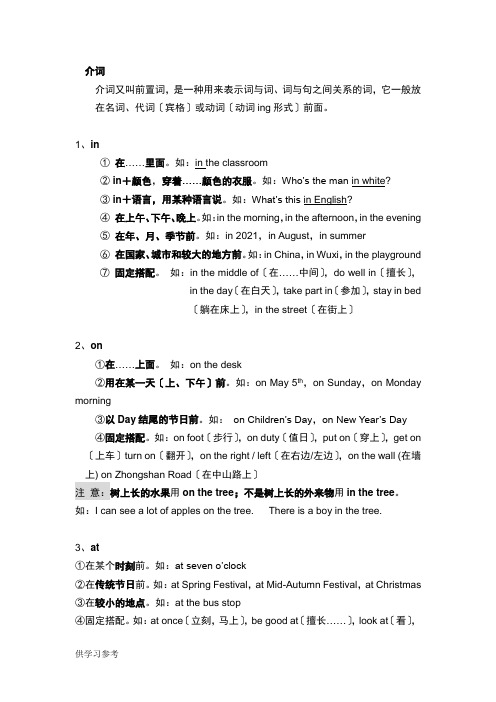
介词介词又叫前置词,是一种用来表示词与词、词与句之间关系的词,它一般放在名词、代词〔宾格〕或动词〔动词ing形式〕前面。
1、in①在……里面。
如:in the classroom②in+颜色,穿着……颜色的衣服。
如:Who’s the man in white?③in+语言,用某种语言说。
如:What’s this in English?④在上午、下午、晚上。
如:in the morning,in the afternoon,in the evening⑤在年、月、季节前。
如:in 2021,in August,in summer⑥在国家、城市和较大的地方前。
如:in China,in Wuxi,in the playground⑦固定搭配。
如:in the middle of〔在……中间〕,do well in〔擅长〕,in the day〔在白天〕,take part in〔参加〕,stay in bed〔躺在床上〕,in the street〔在街上〕2、on①在……上面。
如:on the desk②用在某一天〔上、下午〕前。
如:on May 5th,on Sunday,on Monday morning③以Day结尾的节日前。
如:on Children’s Day,on New Year’s Day④固定搭配。
如:on foot〔步行〕,on duty〔值日〕,put on〔穿上〕,get on 〔上车〕turn on〔翻开〕,on the right / left〔在右边/左边〕,on the wall (在墙上) on Zhongshan Road〔在中山路上〕注意:树上长的水果用on the tree;不是树上长的外来物用in the tree。
如:I can see a lot of apples on the tree. There is a boy in the tree.3、at①在某个时刻前。
六年级英语知识点介词大全

六年级英语知识点介词大全介词在英语语法中扮演着非常重要的角色,它们用来表示名词或代词与其他词之间的关系。
在六年级的英语学习中,掌握各种常用的介词及其用法是非常重要的。
本文将介绍六年级英语知识点中常用的介词大全。
1. 关于地点和位置:在(in)、在…上(on)、在…下(under)、在…里面(inside)、在…旁边(beside)、在…前面(in front of)、在…后面(behind)、在…之间(between)、在…之上(above)、在…之下(below)、在…之内(within)等。
例如:- The book is on the table.(这本书在桌子上。
)- The cat is under the chair.(猫在椅子下。
)- The dog is inside the house.(狗在屋子里。
)2. 关于时间:在…时候(at)、在…之前(before)、在…之后(after)、在…期间(during)、在…的时候(while)、从…到…(from…to)、自从…以来(since)、在…之内(within)、在…之外(outside)等。
例如:- I will see you at 8 o'clock.(我会在8点钟见你。
)- The party will start after lunch.(聚会将在午餐后开始。
)- I have been here since morning.(我从早上开始就一直在这里。
)3. 关于原因:因为(because of)、由于(due to)、为了(for)、由于…而(as a result of)、由于…所以(as a result)、得益于(owing to)等。
例如:- He couldn't come because of the heavy traffic.(他因为交通拥堵而无法来。
)- She bought a new dress for the party.(她为了聚会买了一条新裙子。
小学英语六年级下册专题复习——介词(课件)
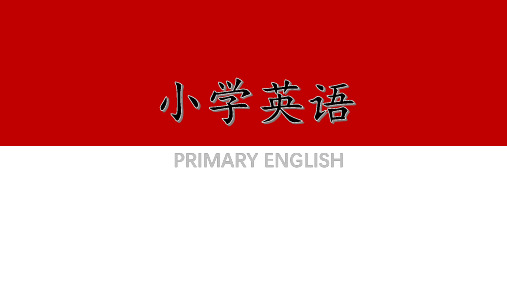
方式介词 by/ with/ in
by: 通过...方式,后面跟名词或动名词。
This pair of shoes is made by hand. We get more information by reading newspapers.
方式介词 by/ with/ in
with: 使用,一般与“有形的工具”或“身体器官”搭配 。
There is a bridge over the river.
时间介词
时间介词 in/ on/ at
Tip1: 24小时黄金法则
at
on ≦24h
in ˃24h
时间点
24小时
in spring on Monday at six o'clock
时间介词 in/ on/ at
Tip1: 24小时黄金法则
方位介词 on/above on 表示在...上面,两者互相接触 above 表示在...下方,两者不接触
The bird is above the box. The bird is on the box.
- Where is the mirror? - It's __a_b_o_v_e__ the table.
Can you sing in English/ in Japanese ? Please write it in ink. That girl in yellow is my younger sister.
方式介词 by/ with/ in
PART 3 介词搭配
介词与名词连用
at first, at last, at home, at school, at the same time, in class, in English, in a minute, in danger, in the morning, on foot, on TV, on the phone...
小学六年级英语语法知识点总结归纳
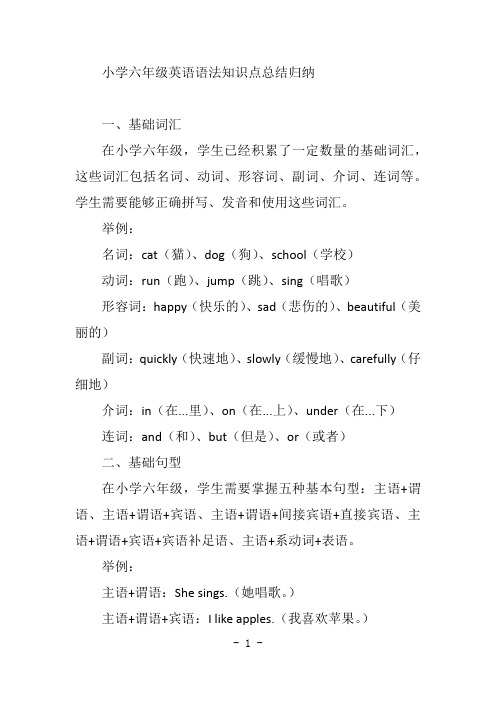
小学六年级英语语法知识点总结归纳一、基础词汇在小学六年级,学生已经积累了一定数量的基础词汇,这些词汇包括名词、动词、形容词、副词、介词、连词等。
学生需要能够正确拼写、发音和使用这些词汇。
举例:名词:cat(猫)、dog(狗)、school(学校)动词:run(跑)、jump(跳)、sing(唱歌)形容词:happy(快乐的)、sad(悲伤的)、beautiful(美丽的)副词:quickly(快速地)、slowly(缓慢地)、carefully(仔细地)介词:in(在...里)、on(在...上)、under(在...下)连词:and(和)、but(但是)、or(或者)二、基础句型在小学六年级,学生需要掌握五种基本句型:主语+谓语、主语+谓语+宾语、主语+谓语+间接宾语+直接宾语、主语+谓语+宾语+宾语补足语、主语+系动词+表语。
举例:主语+谓语:She sings.(她唱歌。
)主语+谓语+宾语:I like apples.(我喜欢苹果。
)主语+谓语+间接宾语+直接宾语:My mother gave me a book.(我妈妈给了我一本书。
)主语+谓语+宾语+宾语补足语:They elected him their monitor.(他们选他为班长。
)主语+系动词+表语:She is happy.(她很高兴。
)三、时态在小学六年级,学生需要掌握一般现在时、现在进行时、一般过去时和一般将来时这四种时态的基本用法。
举例:一般现在时:She always goes to school on time.(她总是按时上学。
)现在进行时:She is studying now.(她现在正在学习。
)一般过去时:Yesterday, we visited the zoo.(昨天,我们参观了动物园。
)一般将来时:I will go to the park tomorrow.(我明天将去公园。
)四、动词的基本形式学生需要了解动词的基本形式,包括原形、第三人称单数形式、现在分词、过去式和过去分词。
小学六年级重要知识归纳介词的用法与常见搭配

小学六年级重要知识归纳介词的用法与常见搭配小学六年级重要知识归纳:介词的用法与常见搭配介词是一个相对小型的词类,但却扮演着连接词与词、短语与短语、句子与句子之间关系的重要角色。
在英语学习中,学习和掌握介词的正确用法与常见搭配是非常重要的。
本文将对小学六年级重要的介词用法与常见搭配进行归纳。
一、介词定义及作用介词是一种词类,用于连接名词、代词或动词等与其他词或短语之间的关系。
它能够表达空间、时间、原因、目的、方式等不同的语境。
例如:1. The book is on the table.(介词on表达位置关系)2. I go to school by bus.(介词by表达交通工具)3. He is good at playing the piano.(介词at表达能力)4. We are learning English for communication.(介词for表达目的)二、常见介词用法1. 位置关系介词介词in、on、at用于表达位置关系。
一般而言,in表示在某个范围内,如in the classroom;on表示在某个平面上,如on the table;at表示在某一点上,如at the park。
2. 时间关系介词介词in、on、at也用于表达时间关系。
in表示在某一段时间内,如in the morning;on表示具体某一天或日期,如on Monday;at表示具体某一时刻,如at 6 o'clock。
3. 方式与原因介词表示方式的介词有by,表示原因的介词有for、because of。
4. 运动方向介词表示运动方向的介词有to、from、into、out of等。
三、常见介词搭配1. in the city(在城市里)2. on the bus(在公交车上)3. at school(在学校)4. in the morning/afternoon/evening(在上午/下午/晚上)5. on Monday/Tuesday/Wednesday(在星期一/二/三)6. at the park/mall(在公园/商场)7. by car/bus/train/ship(乘汽车/公共汽车/火车/船)8. at home(在家)9. in front of(在...前面)10. on the table(在桌子上)以上是部分常见的介词搭配,在实际运用中还有很多其他的用法需要通过不断的练习与积累来掌握。
小学六年级重点英语单词

小学六年级重点英语单词一、动词(Verbs)1. study(学习)- I study English every day.2. play(玩耍)- We often play soccer in the park.3. do(做,干)- What do you do in your free time?4. go(去)- They go to school by bus.5. like(喜欢)- She likes to read books.二、名词(Nouns)1. book(书)- Can I borrow a book from the library?2. school(学校)- My sister goes to school on weekdays.3. friend(朋友)- I have many friends at school.4. family(家庭)- I live with my family in a big house.5. teacher(老师)- Our English teacher is very kind.三、形容词(Adjectives)1. happy(快乐的)- We are all very happy to see you.2. small(小的)- He has a small dog as a pet.3. big(大的)- Their apartment is big and spacious.4. tall(高的)- The basketball player is very tall.5. smart(聪明的)- Lily is a very smart student.四、副词(Adverbs)1. always(总是)- She is always late for class.2. carefully(仔细地)- Please read the instructions carefully.3. quickly(快速地)- The rabbit runs quickly in the forest.4. well(好地)- He plays the piano very well.5. loudly(大声地)- The children are laughing loudly.五、介词(Prepositions)1. in(在……里面)- The cat is sleeping in the box.2. on(在……上面)- There is a book on the table.3. at(在……处)- I will meet you at the park later.4. with(和……一起)- She goes to the movies with her friends.5. for(为了)- They bought a cake for their teacher's birthday.六、冠词(Articles)1. a(一个,一)- I saw a beautiful flower in the garden.2. an(一个,一)- An elephant is a big animal.3. the(定冠词)- The sun rises in the east every morning.七、代词(Pronouns)1. I(我)- I love to eat ice cream.2. you(你)- Do you want to play with me?3. he(他)- He is my best friend.4. she(她)- She has a beautiful smile.5. they(他们)- They are going to the beach tomorrow.八、颜色(Colors)1. red(红色)- My favorite color is red.2. blue(蓝色)- The sky is blue on a sunny day.3. green(绿色)- The grass is always green in the park.4. yellow(黄色)- The sunflower is yellow and bright.5. pink(粉色)- She has a pink dress for the party.九、数字(Numbers)1. one(一)- There is only one apple left.2. two(二)- I have two cats as pets.3. three(三)- The dog has three puppies.4. four(四)- We need four chairs for the guests.5. five(五)- There are five birds in the tree.十、时间(Time)1. morning(早上)- We have English class in the morning.2. afternoon(下午)- I usually play soccer with my friends in the afternoon.3. evening(晚上)- They have dinner together every evening.4. night(夜晚)- The stars shine brightly at night.5. weekend(周末)- I love weekends because there is no school.十一、地点(Places)1. home(家)- I feel happy when I am at home.2. park(公园)- We often go for a walk in the park.3. library(图书馆)- I can borrow books from the library.4. zoo(动物园)- I visited the zoo and saw many animals.5. museum(博物馆)- We learned a lot from the museum exhibit.十二、食物(Foods)1. apple(苹果)- An apple a day keeps the doctor away.2. banana(香蕉)- My sister likes to eat bananas.3. rice(米饭)- Rice is a staple food in our country.4. bread(面包)- I eat bread for breakfast every morning.5. cake(蛋糕)- We had a delicious cake for dessert.十三、动物(Animals)1. cat(猫)- The cat is lying on the sofa.2. dog(狗)- My dog is very loyal to me.3. fish(鱼)- There are many fish in the aquarium.4. bird(鸟)- The bird is singing in the tree.5. elephant(大象)- Elephants are the largest land mammals.十四、职业(Jobs)1. doctor(医生)- My uncle is a doctor.2. teacher(老师)- She wants to be a teacher when she grows up.3. engineer(工程师)- My father is an engineer.4. nurse(护士)- Nurses take care of patients in the hospital.5. pilot(飞行员)- He dreams of becoming a pilot.十五、交通工具(Transportation)1. car(汽车)- We went for a drive in the countryside.2. bus(公交车)- I take the bus to school every day.3. train(火车)- We traveled by train to visit our grandparents.4. airplane(飞机)- They are going on vacation by airplane.5. bicycle(自行车)- Riding a bicycle is a great form of exercise.十六、天气(Weather)1. sunny(晴朗的)- It's a sunny day, perfect for a picnic.2. cloudy(多云的)- The sky is cloudy, it might rain later.3. rainy(下雨的)- Don't forget to bring an umbrella, it's rainy today.4. windy(有风的)- The wind is blowing strongly, be careful.5. snowy(下雪的)- It's snowy outside, let's build a snowman.十七、身体部位(Body Parts)1. head(头)- I hit my head on the door.2. eyes(眼睛)- She has beautiful blue eyes.3. ears(耳朵)- My ears are sensitive to loud noises.4. nose(鼻子)- I have a runny nose.5. mouth(嘴巴)- She has a cute smile with dimples on her cheeks.十八、衣物(Clothing)1. shirt(衬衫)- He wears a white shirt to work.2. pants(裤子)- These pants are too tight for me.3. dress(裙子)- She looks beautiful in that dress.4. shoes(鞋子)- I need a new pair of shoes.5. hat(帽子)- He wears a hat to protect himself from the sun.十九、季节(Seasons)1. spring(春天)- Spring is the season of renewal.2. summer(夏天)- Summer is the hottest season of the year.3. autumn(秋天)- Autumn is the season of harvest.4. winter(冬天)- Winter is the coldest season of the year.5. season(季节)- Each season has its own beauty.二十、日常用品(Daily Necessities)1. pen(钢笔)- I lost my pen, can I borrow yours?2. pencil(铅笔)- I need a sharpener for my pencil.3. ruler(尺子)- The ruler is made of plastic.4. eraser(橡皮)- I made a mistake, I need an eraser.5. backpack(背包)- My backpack is heavy because it's full of books.。
小学六年级毕业考试英语总复习:动词短语、介词短语和其他词组

小学六年级毕业考试英语总复习:动词短语、介词短语和其余词组动词短语、介词短语和其余词组1)ask for向要,恳求2)ask for leave告假3)send for派人去请(叫)4)pay for付的款5)wait for等待6)thank for为感谢7)apologize to sb.for sth.为某事向某人致歉8)look for找寻9)leave for走开去10)fall off跌落11)catch cold 着凉,伤风12)catch up with 追上13)agree with sb. 同意,赞同某人的建议14)filledwith 把装满15)tell sb. about sth. 告诉某人某事16)talk about 讨论17)think about 考虑18)worry about19)look after20)run after21)read after22)smile at23)knock at ()24)shout at ( )25)throw away26)work hardat27)wait in line28)change into29)hurry into30)run into31)hear of32)think of33)catch hold of34)instead of35)hand in36)stay in bed37)hear from38)at once39)at last 最后40)at first 起初,第一41)at the age of 在岁时42)at the end of 在之末43)at thebeginning of在之初44)at the foot of 在脚下45)at the sametime 同时46)atnight/noon 在夜里 / 正午47)with one's help在某人的辅助下,由于某人的辅助48)with the help of 在的辅助下49)with asmile 面带笑脸50)with one's own eyes 亲眼看见51)after awhile 过了一会儿52)from now on 从此刻起53)from then on 从那时起54)f0r example 比如55)far awayfrom 远离56)from morningtill night 从早到晚57)by and by 不久58)by airmail 寄航空邮件59)by ordinarymail 寄平信60)by theway趁便说61)by thewindow在窗边62)by the end of到底为止63)little by little 渐渐地64)in all总合65)in fact 事实上66)in one's twenties 在某人二十几岁时67)in ahurry 仓促68)in the middleof 在中间69)in no time (ina minute) 马上,很快70)in time (ontime) 即时71)in public 民众,公然地72)in orderto 为了73)in frontof 在前方74)in thesun 在阳光下75)in theend 最后,终于76)insurprise 诧异地77)in turn 挨次78)of course 自然79)a bit(of) 有一点儿80)a lot of 好多81)on one's way to 某人在去的路上82)on foot 步行,走路83)a talk on space 一个对于太空的报告84)on the other hand 另一方面85)at/on the weekend 在周末86)on the left(right) 在左( 右)边87)on the otherside of 在另一边88)on the radio经过收音机(无线电广播)89)to one's joy使快乐的是90)to one's surprise使吃惊的是。
小学六年级英语语法 介词
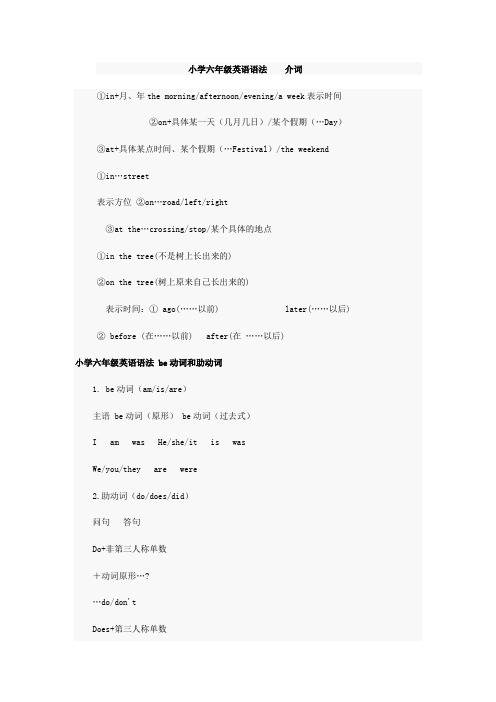
小学六年级英语语法介词①in+月、年the morning/afternoon/evening/a week表示时间②on+具体某一天(几月几日)/某个假期(…Day)③at+具体某点时间、某个假期(…Festival)/the weekend①in…street表示方位②on…road/left/right③at the…crossing/stop/某个具体的地点①in the tree(不是树上长出来的)②o n the tree(树上原来自己长出来的)表示时间:① ago(……以前) later(……以后)② before (在……以前) after(在……以后)小学六年级英语语法 be动词和助动词1. be动词(am/is/are)主语 be动词(原形) be动词(过去式)I am was He/she/it is wasWe/you/they are were2.助动词(do/does/did)问句答句Do+非第三人称单数+动词原形…?…do/don'tDoes+第三人称单数…does/doesn'tDid+所有主格…did/didn't问句答句What do you/they/we…+动词原形?I/They/We+动词原形…。
What does he/she/it…He/She/It +(动词+S)….What did you/they/we/ he/she/it…I/They/We/ He/She/It +动词过去式。
小学六年级英语语法 There be 结构there be 结构肯定句:There is a …There are …一般疑问句:Is there …? Yes, there is./ No, there isn't.Are there…? Yes, there are. /No, there aren't.否定句:There isn't …. There aren't….。
陕旅版小学六年级英语总复习介词
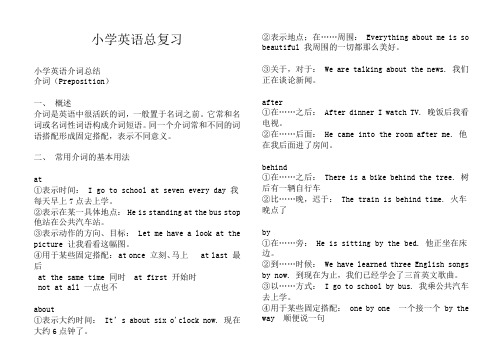
小学英语总复习小学英语介词总结介词(Preposition)一、概述介词是英语中很活跃的词,一般置于名词之前。
它常和名词或名词性词语构成介词短语。
同一个介词常和不同的词语搭配形成固定搭配,表示不同意义。
二、常用介词的基本用法at①表示时间: I go to school at seven every day 我每天早上7点去上学。
②表示在某一具体地点: He is standing at the bus stop 他站在公共汽车站。
③表示动作的方向、目标: Let me have a look at the picture 让我看看这幅图。
④用于某些固定搭配: at once 立刻、马上 at last 最后at the same time 同时 at first 开始时not at all 一点也不about ①表示大约时间:It’s about six o'clock now. 现在大约6点钟了。
②表示地点;在……周围: Everything about me is so beautiful 我周围的一切都那么美好。
③关于,对于: We are talking about the news. 我们正在谈论新闻。
after①在……之后: After dinner I watch TV. 晚饭后我看电视。
②在……后面: He came into the room after me. 他在我后面进了房间。
behind①在……之后: There is a bike behind the tree. 树后有一辆自行车②比……晚,迟于: The train is behind time. 火车晚点了by①在……旁: He is sitting by the bed. 他正坐在床边。
②到……时候: We have learned three English songs by now. 到现在为止,我们已经学会了三首英文歌曲。
六年级英语常用介词用法指南
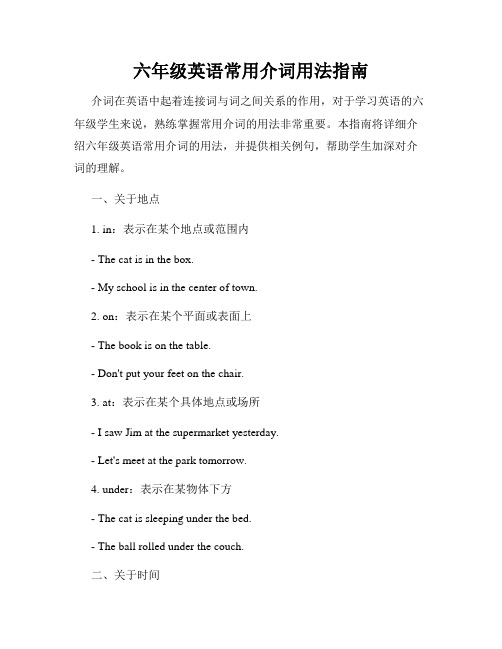
六年级英语常用介词用法指南介词在英语中起着连接词与词之间关系的作用,对于学习英语的六年级学生来说,熟练掌握常用介词的用法非常重要。
本指南将详细介绍六年级英语常用介词的用法,并提供相关例句,帮助学生加深对介词的理解。
一、关于地点1. in:表示在某个地点或范围内- The cat is in the box.- My school is in the center of town.2. on:表示在某个平面或表面上- The book is on the table.- Don't put your feet on the chair.3. at:表示在某个具体地点或场所- I saw Jim at the supermarket yesterday.- Let's meet at the park tomorrow.4. under:表示在某物体下方- The cat is sleeping under the bed.- The ball rolled under the couch.二、关于时间1. at:表示具体的时间点- The movie starts at 7 o'clock.- I have a doctor's appointment at 2 p.m.2. on:表示某一天或日期- We celebrate Christmas on December 25th.- I always visit my grandparents on Sundays.3. in:表示在某一段时间内- She will come back in an hour.- We usually have winter break in December.三、表示原因1. because of:因为- She couldn't come because of the heavy rain.- He was late for school because of the traffic.2. due to:由于- The game was canceled due to the bad weather. - The flight was delayed due to technical problems.四、关于方向和运动1. to:表示朝着某个地方或目标的方向- I walked to the park with my friends.- She gave a present to her teacher.2. into:表示进入某个地方或物体内部- The dog jumped into the river.- She put the books into her bag.3. out of:表示从某个地方或物体内部离开- The cat ran out of the house.- Take the cookies out of the oven.五、其他常用介词1. with:表示伴随或使用某事物- I went to the park with my brother.- He writes with a pen.2. for:表示做某事的目的- She bought a gift for her friend's birthday. - He is studying hard for the upcoming exam.3. by:表示通过某种方式或工具- I go to school by bus.- She learned English by watching movies.4. about:关于- We had a discussion about the new book.- The teacher taught us about the solar system.以上就是六年级英语常用介词用法的指南,希望能对学生们的学习有所帮助。
小学六年级英语介词用法及练习

介词用法及练习1、早、午、晚要用in例:in the morning 在早上in the afternoon 在下午in the evening 在晚上in the day 在白天2、at黎明、午、夜、点与分例: at dawn, at daybreak 在黎明时候at noon 在中午at night 在夜间at midnight 在午夜以上短语都不用冠词at six o'clock 在6点钟at 7:30 (seven thirty) 在7点半at half past eleven 在11点半at nine fifteen 在9点15分at ten thirty a.m. 在上午10点30分也可以写成seven to five 5点差7分(半小时以上) five minutes after two 2点过5分at a quarter to two 1点45分at the weekend 在周末3、年、月、年月、季节、周即在"来年",在"某月",在"某年某月",在四季,在第几周等都要用in。
在某年某月某日则用on例;in 1986 在1986年in 1927 在1927年in April 在四月in March 在三月in December 1986 1986年12月in July l983 1983年7月in spring 在春季in summer 在夏季in autumn 在秋季in winter 在冬季in the fist week of this semester 这学期的第一周in the third week 在第三周以及:in the bright sunlight 在明亮的阳光下 a merchant in disguise 乔装的商人the woman in white (black, red, yellow) 穿着白(黑、红、黄)色衣服的妇女in uniform 穿着制服in mourning 穿着丧服in brown shoes 穿着棕色鞋in his shirt sleeves 穿着衬衫5、将来时态in...以后after... (从过去开始)例: They will come back in 10 days. 他们将10天以后回来。
小学六年级介词知识点
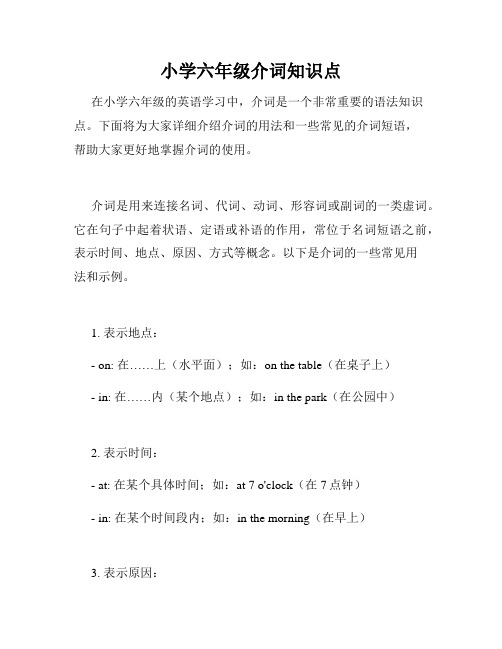
小学六年级介词知识点在小学六年级的英语学习中,介词是一个非常重要的语法知识点。
下面将为大家详细介绍介词的用法和一些常见的介词短语,帮助大家更好地掌握介词的使用。
介词是用来连接名词、代词、动词、形容词或副词的一类虚词。
它在句子中起着状语、定语或补语的作用,常位于名词短语之前,表示时间、地点、原因、方式等概念。
以下是介词的一些常见用法和示例。
1. 表示地点:- on: 在……上(水平面);如:on the table(在桌子上)- in: 在……内(某个地点);如:in the park(在公园中)2. 表示时间:- at: 在某个具体时间;如:at 7 o'clock(在7点钟)- in: 在某个时间段内;如:in the morning(在早上)3. 表示原因:- because of: 因为;如:He is absent because of illness(他因病缺席)4. 表示方式:- by: 通过;如:go to school by bus(乘公交车去学校)5. 表示方向:- to: 往;如:go to the park(去公园)- from: 从;如:come from Beijing(来自北京)6. 表示目的:- for: 为了;如:buy a gift for my friend(为我的朋友买个礼物)7. 表示关系:- of: 属于;如:a book of mine(我的一本书)这些是介词的一些常见用法和示例,通过不断的练习,同学们可以更好地掌握介词的使用。
在学习介词时,还需要注意一些常用的介词短语。
下面列举了一些常见的介词短语及其用法:1. in front of: 在……前面;如:She is standing in front of the school(她站在学校前面)。
2. next to: 在……旁边;如:My house is next to the park(我的房子在公园旁边)。
小学六年级介词的常见用法归纳与解析

小学六年级介词的常见用法归纳与解析介词是英语中一种非常重要且常用的词类,它用来连接名词、代词、动词、形容词和副词等,起到表示位置、方向、时间、原因等等的作用。
在小学六年级的学习中,理解和正确运用介词是非常关键的。
本文将介绍小学六年级常见的介词用法以及对其进行分析和解析。
一、表示位置和方向的介词1. in介词"in"表示在某个范围、区域内,常用来指示地点或位置。
例如:in the classroom(在教室里)、in the park(在公园里)2. on介词"on"用来表示在某个表面或较大的平面上。
例如:on the table(在桌子上)、on the floor(在地板上)3. at介词"at"用来表示确切的位置或地点,通常用在某个建筑物或公共场所名称之后。
例如:at the bus stop(在公交车站)、at the library(在图书馆)4. into介词"into"表示进入某个地点或物体。
例如:jump into the water(跳进水中)、walk into the house(走进房子)5. out of介词"out of"表示从某个地方或物体出来。
例如:get out of the car(从车里出来)、take the book out of the bag (把书从包里拿出来)二、表示时间的介词1. at介词"at"用来指示具体的时间点。
例如:at 7 o'clock(在7点钟)、at noon(在中午)2. on介词"on"用来指示具体的日期或星期几。
例如:on Monday(在星期一)、on May 1st(在5月1日)3. in介词"in"用来指示一个时间段或某个月、季节、年代。
例如:in the morning(在早上)、in winter(在冬天)三、表示原因和目的的介词1. for介词"for"表示为了某个目的或原因。
六年级介词知识点
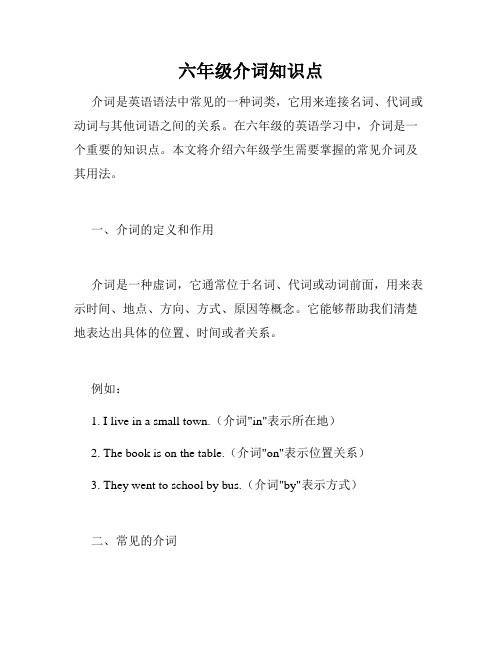
六年级介词知识点介词是英语语法中常见的一种词类,它用来连接名词、代词或动词与其他词语之间的关系。
在六年级的英语学习中,介词是一个重要的知识点。
本文将介绍六年级学生需要掌握的常见介词及其用法。
一、介词的定义和作用介词是一种虚词,它通常位于名词、代词或动词前面,用来表示时间、地点、方向、方式、原因等概念。
它能够帮助我们清楚地表达出具体的位置、时间或者关系。
例如:1. I live in a small town.(介词"in"表示所在地)2. The book is on the table.(介词"on"表示位置关系)3. They went to school by bus.(介词"by"表示方式)二、常见的介词1. 时间介词常用的时间介词有:at, on, in。
- "at"用于表示具体的时间点,如:at 7 o'clock;- "on"用于表示具体的日期或星期几,如:on Monday;- "in"用于表示较长的时间段,如:in June。
2. 地点介词常用的地点介词有:in, at, on。
- "in"用于表示大的范围或建筑物内部,如:in the zoo;- "at"用于表示具体的位置,如:at the bus stop;- "on"用于表示表面或较小的地方,如:on the table。
3. 方向介词常用的方向介词有:to, from, into。
- "to"表示朝向某个地方,如:go to school;- "from"表示从某个地方出发,如:come from Canada;- "into"表示进入某个地方,如:go into the room。
小学英语六年级语法--介词
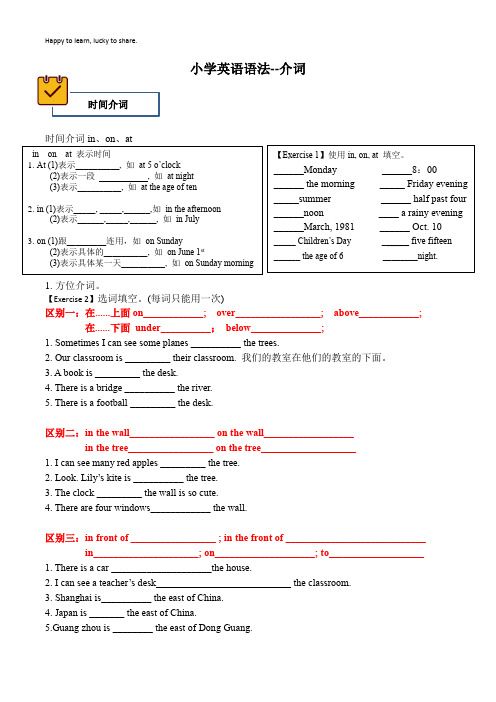
小学英语语法--介词时间介词in 、on 、at1. 方位介词。
【Exercise 2】选词填空。
(每词只能用一次)区别一:在......上面on____________; over_________________; above____________;在......下面 under__________; below______________;1. Sometimes I can see some planes __________ the trees.2. Our classroom is _________ their classroom. 我们的教室在他们的教室的下面。
3. A book is _________ the desk.4. There is a bridge __________ the river.5. There is a football _________ the desk.区别二:in the wall_________________ on the wall__________________in the tree_________________ on the tree___________________1. I can see many red apples _________ the tree.2. Look. Lily’s kite is __________ the tree.3. The clock _________ the wall is so cute.4. There are four windows____________ the wall.区别三:in front of _________________ ; in the front of ____________________________in_____________________; on____________________; to___________________1. There is a car ____________________the house.2. I can see a teacher’s desk___________________________ the classroom.3. Shanghai is__________ the east of China.4. Japan is _______ the east of China.5.Guang zhou is ________ the east of Dong Guang.in on at 表示时间 1. At (1)表示__________, 如 at 5 o’clock (2)表示一段 , 如 at night (3)表示__________, 如 at the age of ten2. in (1)表示_____, _____,______,如 in the afternoon (2)表示______,_____,______, 如 in July3. on (1)跟_________连用,如 on Sunday(2)表示具体的__________, 如 on June 1st(3)表示具体某一天__________, 如 on Sunday morning【Exercise 1】使用in, on, at 填空。
小学六年级英语汇总介词
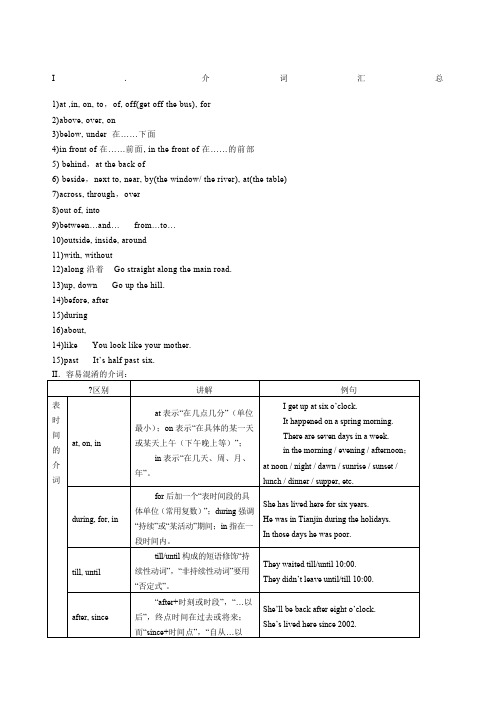
I.介词汇总1)at ,in, on, to,of, off(get off the bus), for2)above, over, on3)below, under 在……下面4)in front of在……前面, in the front of在……的前部5) behind,at the back of6) beside,next to, near, by(the window/ the river), at(the table)7)across, through,over8)out of, into9)between…and… from…to…10)outside, inside, around11)with, without12)along沿着Go straight along the main road.13)up, down Go up the hill.14)before, after15)during16)about,14)like You look like your mother.15)past It’s half past six.1.表示地点位置的介词1)at ,in, on, to,forat (1)表示在小地方; (2)表示“在……附近,旁边”in (1)表示在大地方; (2)表示“在…范围之内”。
on 表示毗邻,接壤,“在……上面”。
to 表示在……范围外,不强调是否接壤;或“到……”2)above, over, on 在……上above 指在……上方,不强调是否垂直,与below相对;over指垂直的上方,与under相对,但over与物体有一定的空间,不直接接触。
on表示某物体上面并与之接触。
The bird is flying above my head.There is a bridge over the river.He put his watch on the desk.3)below, under 在……下面under表示在…正下方below表示在……下,不一定在正下方There is a cat under the table.Please write your name below the line.4)in front [frant]of, in the front of在……前面in front of…意思是“在……前面”,指甲物在乙物之前,两者互不包括;其反义词是behind (在……的后面)。
小学六年级介词知识点总结

小学六年级介词知识点总结介词是连接词组和词组之间关系的词语,在句子中起到指示、描述、修饰等作用。
介词通常位于名词、代词或动词之前,用来说明地点、时间、方式、原因等概念。
在小学六年级的英语学习中,介词是一个重要的语法知识点。
下面是关于小学六年级介词知识点的总结:一、常见的介词:1. in(在):用于表示在某个地方或某个固定的位置,如in the park(在公园)。
2. on(在、在上面):用于表达在接触面或垂直面上的位置,如on the table(在桌子上)。
3. at(在、在...处):用于表示在一个地点,如at school(在学校)。
4. under(在...下面):用于表示在某物的下方,如under the table(在桌子下面)。
5. next to(紧挨着、在...旁边):用于表示某物在另一物体的旁边,如next to the park(在公园旁边)。
6. between(在...之间):用于表示两个物体之间的位置关系,如between the trees(在树木之间)。
7. behind(在...后面):用于表示某物在另一物体的后方,如behind the house(在房子后面)。
8. in front of(在...前面):用于表示某物在另一物体的前面,如in front of the car(在汽车前面)。
9. among(在...之中):用于表示在一群物体中的位置,如among the flowers(在花中间)。
10. with(与...一起):用于表示携带或陪伴关系,如go to the park with my friends(和我的朋友一起去公园)。
二、介词的使用规则:1. 表示地点:介词in用于大的地点,如国家、城市等;介词on用于具体的表面,如桌子、地图等;介词at用于具体的场所,如学校、商店等。
2. 表示时间:介词in用于年、季节;介词on用于具体的日期或星期;介词at用于具体的时刻。
六年级毕业考试英语语法之介词
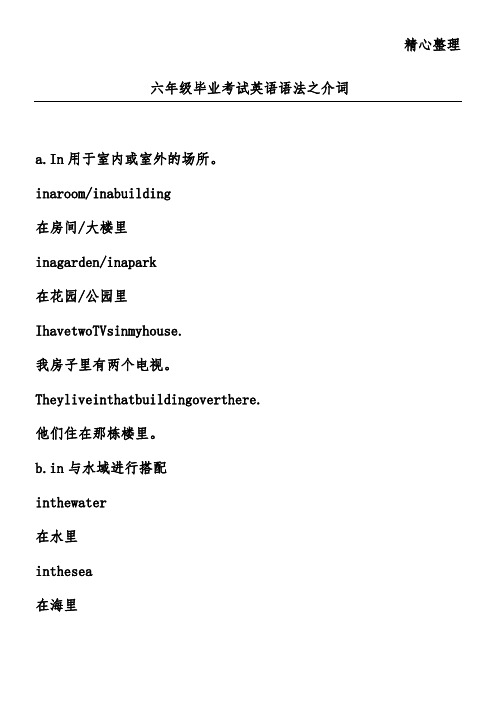
精心整理六年级毕业考试英语语法之介词a.In 用于室内或室外的场所。
b.in 在水里inthesea在海里inariver在河里Ilikeswimminginlakeswhentheweatherishot. 我喜欢天气热时在湖里游泳。
c.in一行一队Wehadtowaitinaqueuetogetintothebank.我们只得站成一队等着进入公园。
d.in与城市、县、州、地区和国家搭配PeterlivesinChicago.皮特住在芝加哥。
HelenisinFrancethismonth.Nextmonthshe'llbeinGermany. 海伦这个月在法国。
下个月她就在德国了。
a.atattheendofthestreet在街的尽头I'llmeetyouatthemovietheateratsixo'clock.我六点在电影院见你。
Helivesinthehouseattheendofthestreet.他住在街尾那间房子里。
b.at与页面位置进行搭配Thenameofthechapterisatthetopofthepage.c.at蒂姆坐在教室后排。
Pleasecomeandsitdownatthefrontoftheclass. 请过来,坐在教室前排。
3.Ona.on与物体表面进行搭配ontheceiling/onthewall/onthefloorb.on去年我去了毛伊岛。
那儿真是太棒了!WevisitedfriendswholiveonanislandintheBahamas. 我们拜访了住在巴哈马群岛的朋友们。
c.on与方向进行搭配ontheleft左边ontheright右边使用into来表示从一个地方到另一个地方的移动。
Idroveintothegarageandparkedthecar.我把车开进车库,并停好。
PeterwalkedintothelivingroomandturnedontheTV.皮特走进卧室,打开电视。
- 1、下载文档前请自行甄别文档内容的完整性,平台不提供额外的编辑、内容补充、找答案等附加服务。
- 2、"仅部分预览"的文档,不可在线预览部分如存在完整性等问题,可反馈申请退款(可完整预览的文档不适用该条件!)。
- 3、如文档侵犯您的权益,请联系客服反馈,我们会尽快为您处理(人工客服工作时间:9:00-18:30)。
小学六年级英语汇总介词 Revised by BETTY on December 25,2020I.介词汇总1)at ,in, on, to,of, off(get off the bus), for2)above, over, on3)below, under 在……下面4)in front of在……前面, in the front of在……的前部5) behind,at the back of6) beside,next to, near, by(the window/ the river), at(the table)7)across, through,over8)out of, into9)between…and… from…to…10)outside, inside, around11)with, without12)along沿着 Go straight along the main road.13)up, down Go up the hill.14)before, after15)during16)about,14)like You look like your mother.15)past It’s half past six.1.表示地点位置的介词1)at ,in, on, to,forat (1)表示在小地方; (2)表示“在……附近,旁边”in (1)表示在大地方; (2)表示“在…范围之内”。
on 表示毗邻,接壤,“在……上面”。
to 表示在……范围外,不强调是否接壤;或“到……”2)above, over, on 在……上above 指在……上方,不强调是否垂直,与 below相对;over指垂直的上方,与under相对,但over与物体有一定的空间,不直接接触。
on表示某物体上面并与之接触。
The bird is flying above my head.There is a bridge over the river.He put his watch on the desk.3)below, under 在……下面under表示在…正下方below表示在……下,不一定在正下方There is a cat under the table.Please write your name below the line.4)in front [frant]of, in the front of在……前面in front of…意思是“在……前面”,指甲物在乙物之前,两者互不包括;其反义词是behind(在……的后面)。
There are some flowers in front of the house.(房子前面有些花卉。
) in the front of 意思是“在…..的前部”,即甲物在乙物的内部.反义词是at the back of…(在……范围内的后部)。
There is a blackboard in the front of our classroom.我们的教室前边有一块黑板。
Our teacher stands in the front of the classroom.我们的老师站在教室前.(老师在教室里)5)beside,behindbeside 表示在……旁边behind 表示在……后面2.表示时间的介词1)in , on,at 在……时in表示较长时间,如世纪、朝代、时代、年、季节、月及一般(非特指)的早、中、晚等。
如 in the 20th century, in the 1950s, in 1989, in summer, in January, in the morning, in one’s life , in one’s thirties等。
on表示具体某一天及其早、中、晚。
如on May 1st, on Monday, on New Year’s Day, on a cold night in January, on a fine morning, on Sunday afternoon等。
at表示某一时刻或较短暂的时间,或泛指圣诞节,复活节等。
如at 3:20, at this time of year, at the beginning of, at theend of …, at the age of …, at Christmas, at night, at noon, atthis moment等。
注意:在last, next, this, that, some, every 等词之前一律不用介词。
如:We meet every day.2)in, after 在……之后“in +段时间”表示将来的一段时间以后;“after+段时间”表示过去的一段时间以后;“after+将来的时间点”表示将来的某一时刻以后。
3)from, since 自从……from仅说明什么时候开始,不说明某动作或情况持续多久;since表示某动作或情况持续至说话时刻,通常与完成时连用。
since表示"自(某具体时间)以来",常用作完成时态谓语的时间状语。
since liberation(1980)自从解放(1980年)以来 They have been close friends since childhood.他们从小就是好朋友。
(1)since the war是指"自从战争结束以来",若指"自从战争开始以来",须说"sincethe beginning of the war"。
(2)不要将since与after混淆。
比较:He has worked here since 1965.(指一段时间,强调时间段)自从1965年以来,他一直在这儿工作。
He began to work here after 1965.(指一点时间,强调时间点)从1965年以后,他开始在这儿工作。
4)after, behind 在……之后after主要用于表示时间;behind主要用于表示位置。
时间名词前介词用法口诀年前周前要用in具体日子要用on遇到几号也用on上午下午得是in要说某日上下午用on换in记清楚午夜黄昏用at黎明用它也不错at用在时分前说“差”可要用上to说"过''要用past3.表示运动方向的介词:across, through 通过,穿过across表示横过,即从物体表面通过,与on有关,为二维through穿过,即从物体内部穿过,与in有关,为三维。
4.表示“在……之间”的介词:表示“在……之间”的介词在英语中属于方位介词,如in front of ,behind ,on, in, near, under, upbetween, amongbetween指在两个人或两个事物之间;among指在三个或三个以上的人或事物之间。
5.表示其他意义的介词1)on ,about 关于on 表示这本书,这篇文章或演说是严肃的,或学术性的,可供专门研究这一问题的人阅读;about表示内容较为普通,不那么正式。
2)by, with, in 表示方法、手段、工具by 以……方法、手段或泛指某种交通工具;with 表示用…工具、手段,一般接具体的工具和手段;in 表示用…方式,用…语言(语调、笔墨、颜色)等;3)except, besides 除了except 除……之外,不包括在内;besides 除……之外,包括在内。
Except for Mr. Wang, we went to see the film.(王先生没去)Besides Mr. Wang, we also went to see the film.(王先生也去了) 27)near 靠近....。
There are some flowers near the house.房子附近有一些花。
28)of ...的,属于...。
This is a map of China.这是一张中国地图。
29)off 离开...,在...之外。
The young man got off the train quickly.那个年青人很快下了火车。
I live in a village a little way off the main road.我住在离大路不远的一个村庄里。
30)on 在...之上。
My book is on the table.我的书在桌子上。
31)out of 从...出来,在...之外。
The dog run out of the house.狗从房子里跑出来。
32)outside ... 外边.They are waiting outside the gate.他们在门外等着。
33)over 在...之上,遍于...之上,越过...。
There is a light over the desk.桌子上方有盏灯。
He is over sixty years old.他有六十多岁。
34)past 越过...,过...,超越...。
The students walked past the post office.学生们走过了邮局。
It is ten past two.现在是两点十分。
35)round 围着...,绕过...,在...周围。
We sat round the table.我们围着桌子坐下。
The earth goes round the sun.地球绕着太阳转。
36)since 自... 以后,自...以来。
He has made great progress in English since he came into the college.从他来到大学后,他的英语有了很大进步。
37)through 经过...,穿过...。
(立体层面)They went through the forest.他们穿过了森林。
38)throughout 遍及...,在各处。
The police searched for the criminal throughout the mountain.警察搜山寻找犯人。
39)till 直到...,在...以前。
He didn't come back till eleven o'clock.他直到十一点钟才回来。
We'll be home till six.六点以前我们都会在家。
40)to 到...,向...,趋于。
How long is it from here to the station?从这儿到车站有多远?41)under 在...之下,低于。
